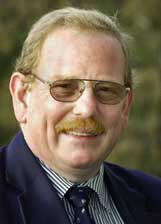UC Berkeley Press Release
Astrophysicist Reinhard Genzel wins million-dollar Shaw Prize
BERKELEY – Astrophysicist Reinhard Genzel, a professor of physics at the University of California, Berkeley, and director of the Max Planck Institute for Extraterrestrial Physics in Garching, Germany, has been awarded the 2008 Shaw Prize in Astronomy, The Shaw Prize Foundation in Hong Kong announced today (Tuesday, June 10.)
 Reinhard Genzel |
"Reinhard is doing very important work," said Nobel Laureate Charles Townes, a UC Berkeley professor emeritus of physics who collaborated with Genzel more than 25 years ago on early observations of the Milky Way's core. "We've been working on it together for a long time, and I am glad he has gotten it nailed down now perfectly."
Genzel joins two other UC Berkeley astrophysicists who have received the Shaw Prize in Astronomy. Saul Perlmutter, UC Berkeley professor of physics and staff scientist at Lawrence Berkeley National Laboratory, shared the award in 2006; and Geoffrey Marcy, UC Berkeley professor of astronomy, shared the award in 2005. The late Shiing-Shen Chern, at the time a UC Berkeley professor emeritus of mathematics, won the 2004 Shaw Prize in Mathematics.
In 1969, Donald Lynden-Bell and Martin Rees suggested that the Milky Way might contain a supermassive black hole at its center, but evidence was lacking because the galactic core is obscured by interstellar dust and could only be detected as a relatively faint radio source.
Genzel was a post-doctoral fellow at UC Berkeley working with Townes when they first presented observations hinting that the center of our galaxy harbored a massive black hole. The evidence was weak, however, and Genzel worked steadfastly over the ensuing decades to prove his case.
"He now has a remarkable technique in which he can measure very accurately and determine quite precisely the mass and behavior of stars circulating around the galactic center," Townes said. Genzel and his collaborators developed this technique to use with telescopes of the European Sothern Observatory, and for many years, Genzel's team carried out a program of observing the galactic center and its surrounding stars.
He and colleagues cemented their assertions in 2002, when they reported the orbit of a star around the galactic center and concluded that it circled an object with the mass of 3 million stars like our sun, all tightly packed into a region less than the size of our solar system. Other teams have confirmed this finding, though, Townes said, "Reinhard was first and has done the best work."
According to UC Berkeley theoretical astrophysicist Eliot Quataert, professor of astronomy and physics, Genzel's group "has continued to make quite remarkable strides, both in observing the orbits of stars around the black hole, which has provided evidence beyond any reasonable doubt that there is a black hole at the center of the galaxy, and then also pushing forward in trying to get observations of the emission from the gas that is spiraling into the black hole."
Quataert noted that Genzel's group and a competing group at UCLA have now measured the orbits of around a dozen stars circling the black hole, confirming Genzel's 2002 results and pinning down the mass of the central black hole to nearly 4 million times that of the sun.
The Shaw Prize is an international award to honor individuals who are currently active in their respective fields and who have achieved distinguished and significant advances, who have made outstanding contributions in culture and the arts, or who in other domains have achieved excellence.
Genzel and other winners of the 2008 Shaw Prizes will be presented with a medal at a ceremony in Hong Kong on Tuesday, Sept. 9, 2008.
For further information:

